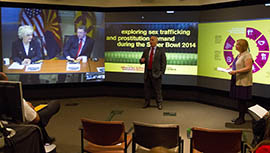Cronkite News has moved to a new home at cronkitenews.azpbs.org. Use this site to search archives from 2011 to May 2015. You can search the new site for current stories.
Study: Volume of sex trafficking during Super Bowl too much for one agency
TEMPE – A study of advertising placed during the recent Super Bowl in New Jersey suggests the volume of sex trafficking that will occur when the event comes to Arizona in 2015 will likely exceed the ability of any one law enforcement agency to address.
Phoenix Police Lt. James Gallagher, who co-authored the study with Arizona State University’s School of Social Work and The McCain Institute, said law enforcement must coordinate to combat sex trafficking during major events.
“Jurisdiction simply does not matter when there is as great a profit potential as there is in sex trafficking,” Gallagher said at a news conference Thursday.
Each day between Jan. 24 and Feb. 2, researchers found between 201 and 459 online ads involving prostitution in the New York and New Jersey area. The study compared those results to Phoenix during the same period: 132 to 275 ads each day.
“As you can see, there are a significant number of ads being placed online to sell sex,” said Dominique Roe-Sepowitz, the study’s author and director of ASU’s Office of Sex Trafficking Intervention Research, part of the School of Social Work.
Researchers also found 38 websites with ads suggesting that the victims of sex trafficking were likely to be minors.
During that period in Manhattan, 100 women were arrested for prostitution and 16 minors caught up in sex trafficking were rescued, Roe-Sepowitz said.
The study aimed to establish a baseline for the Valley because of the coming Super Bowl and because of the near constant supply of tourists and conference attendees throughout the year.
Cindy McCain, co-chair of a task force Gov. Jan Brewer assembled to address human trafficking, participated in the news conference from Washington.
“We view this as a human rights issue,” she said.
Kurt Volker, The McCain Institute’s executive director, said the data, while only a snapshot, is highly revealing.
“The Super Bowl is only an example. It is not a cause of sex trafficking,” he said, adding that traffickers are looking for environments with large groups of people.
“This is about the way traffickers behave and how we can analyze and attack them,” Volker said.
Gallagher, the Phoenix police lieutenant, said the research will be available to anyone who asks.
“We don’t presume our matrix is perfect, but we think it’s pretty good and we want to make it perfect,” he said. “We want Arizona to be the example of progressive and innovative partnerships designed to have an impact on sex trafficking.”







